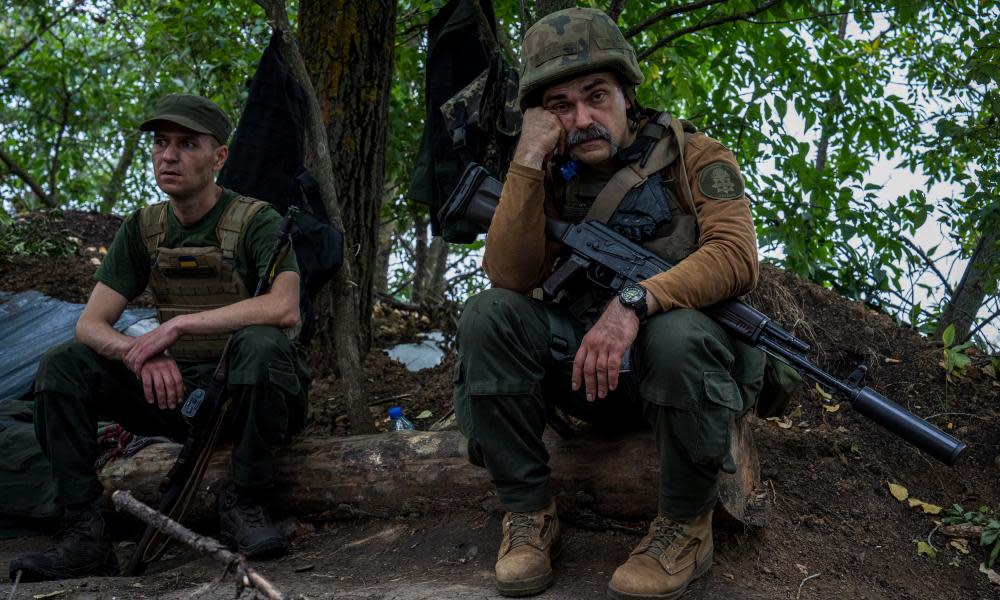As Putin’s war spreads panic across Europe, Ukrainians must fear a stab in the back

The west’s strategic aims in Ukraine – to repulse Russia’s invasion, restore national sovereignty and score a victory for global democracy over “the forces of darkness” – were clearly set out by US president Joe Biden in Warsaw in March and subsequently endorsed by UK and European leaders.
What has always been less clear is whether they honestly expect to achieve these aims, given Nato’s less than heroic refusal to get directly involved. An uncomfortable, even distressing question now arises: should Ukrainians prepare for a stab in the back this winter?
Nearly six months into the war, the widening gap between rhetoric and reality grows potentially fatal. Public outrage over the invasion is giving way to concern, bordering on panic, about its alarming knock-on effects on energy and food prices and the cost of living.
That in turn is feeding doubts about western staying power. How long before Europe’s already shaky unity crumbles, if and when Russia’s gas tap is finally turned off?
Biden framed the war as part of a universal struggle between good and evil. “We stand with you,” he told Ukrainians. “Swift and punishing costs are the only things that are going to get Russia to change course.”
Much of his speech was familiar feelgood flannel. Unprecedented sanctions notwithstanding, Russia hasn’t changed course.
Channelling Biden that same month, Boris Johnson portentously pronounced that “Vladimir Putin’s act of aggression must fail and be seen to fail.” But Johnson was vague about the longer term, and overstated British leverage. “We cannot allow the Kremlin to bite off chunks of an independent country and inflict immense human suffering,” he declared. Yet that’s exactly what’s been happening ever since.
Liz Truss indulged in more delusional over-promising in April. Britain’s foreign secretary and possible next prime minister demanded Russia vacate Crimea and withdraw to pre-2014 borders. Sounding like a demented generalissimo, Truss vowed: “We are going to keep going further and faster to push Russia out of the whole of Ukraine.” Who is “we”? You and whose army?
This, of course, is the point. The US pledged another $1bn in military aid last week, taking its total under Biden to $9.8bn. The equivalent UK figure exceeds £2.3bn. EU countries have also greatly increased arms supplies. Without this help, Ukraine would have faced defeat.
But Biden’s cautious determination to avoid head-on confrontation at all costs means that while Russia may not ultimately win, it is unlikely to definitively lose. The war resembles a simmering saucepan that never quite comes to the boil.
It might have been very different, had western politicians found the courage to actively take Ukraine’s side in February-March. The chaotic initial Russian drive for Kyiv left large troop convoys vulnerable to air attack. A convincing display of Pentagon-style “shock and awe”, just as Putin was anticipating quick, easy victory, could have stopped the entire invasion in its tracks.
Might-have-been moments, viewed in hindsight, don’t win wars. But for the record, other early opportunities were squandered, including the idea of Nato-protected cities and safe havens for civilians inside Ukraine.
Prompt action by western navies could have foiled Russia’s reckless, still globally harmful Black Sea food blockade. Many innocent lives might have been spared.
It may be too late now, though Biden is not solely to blame. For all his bombastic, gung-ho talk, Johnson was content to hide behind Washington’s refusal to fight. So were France’s Emmanuel Macron and Germany’s Olaf Scholz.
Ukraine faces a brutal, years-long war of attrition – as does the west
Such unanimity reinforces suspicions that, in their hearts, they do not really believe that the west’s aim of humbling Russia is attainable or even desirable.
In the likely absence of a pathway to outright military victory, Kyiv’s available choices are all more or less repellent. Despite its expected southern offensive, its doughty defence of Donetsk and last week’s Crimea explosions, Ukraine faces a brutal, years-long war of attrition – as does the west.
Parallel pressure will consequently increase for a ceasefire or some kind of doubtless temporary peace deal, to relieve Europe’s economic pain. Rightwing populist parties in Italy and elsewhere are poised to take advantage. Leaderless Britain is focused on the home front.
In Germany, polling suggests up to 50% favour territorial concessions to Russia. The sharp divide between those seeking “justice” for Ukraine and those seeking “peace” is reflected across Europe – and is tilting against Kyiv.
Most troubling, ironically, is the last remaining war scenario – so-called “catastrophic success” for Ukraine’s forces that, confounding all predictions, presages regime-threatening defeat for Russia.
This possibility totally terrifies western politicians. In such a scenario, described by General Sir Richard Barrons, a desperate Putin resorts to low-yield tactical nuclear weapons to stave off collapse.
“This is not unthinkable – it is only unpalatable,” Barrons, a former British commander, chillingly warned.
How to respond? Might such a taboo-breaking atrocity result in Ukraine joining Nato and all-out war with Russia proper? In some respects, the west, through its timidity and half-measures, would have brought such a cataclysm on itself. Barrons has no ready answers. No one does.
Except, except… perhaps an exasperated, emotional Biden unintentionally hit on the best idea when he concluded his Warsaw speech with an ad lib about Putin, addressed to Russians as much as anyone else. “For God’s sake, this man cannot remain in power,” he growled.
Biden’s right. Putin is a foul ogre, a war criminal, a monstrous throwback from a bygone age. As previously argued here, he is unfit to rule.
With him gone, the crisis he single-handedly engineered would not disappear – but would be more easily resolved. In fact, this may be Ukrainians’ (and Russians’) only hope of a happy ending.
Get Putin. Take him down. Lock him up. That’s a strategic aim all could and should energetically pursue.

 Yahoo Movies
Yahoo Movies 
